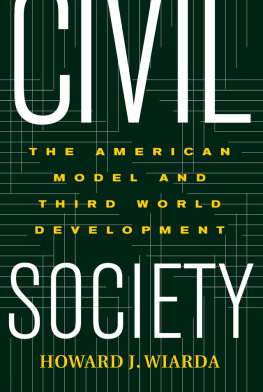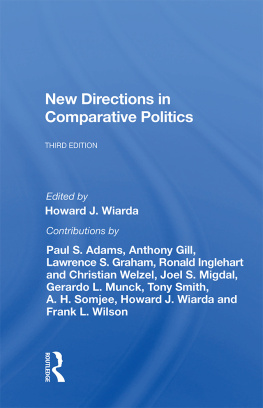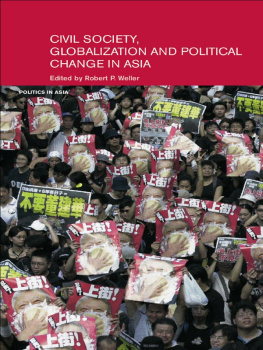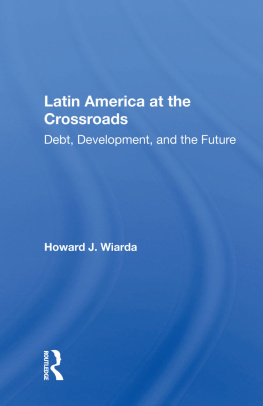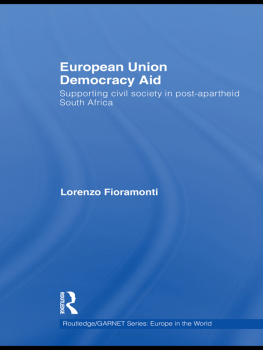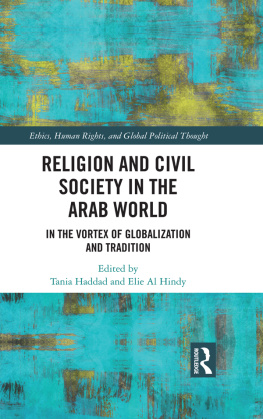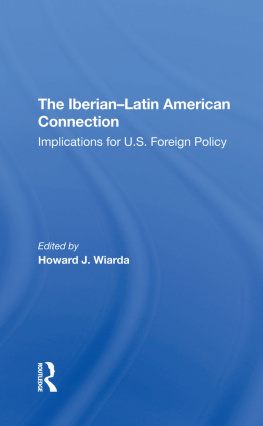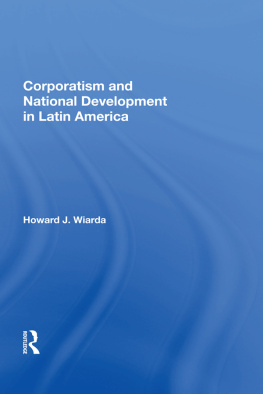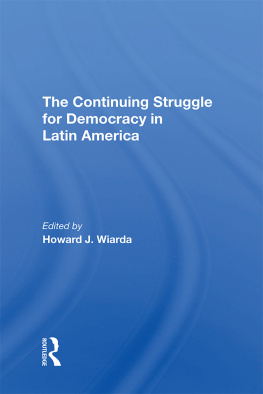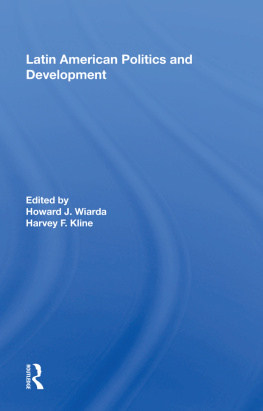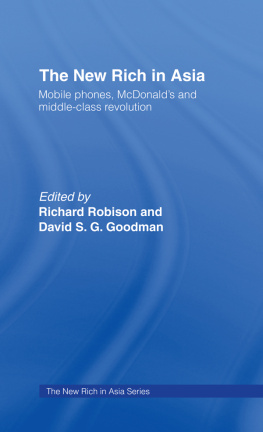First published 2003 by Westview Press
Published 2018 by Routledge
711 Third Avenue, New York, NY 10017, USA
2 Park Square, Milton Park, Abingdon, Oxon OX14 4RN
Routledge is an imprint of the Taylor & Francis Group, an informa business
Copyright 2003 Taylor & Francis
All rights reserved. No part of this book may be reprinted or reproduced or utilised in any form or by any electronic, mechanical, or other means, now known or hereafter invented, including photocopying and recording, or in any information storage or retrieval system, without permission in writing from the publishers.
Notice:
Product or corporate names may be trademarks or registered trademarks, and are used only for identification and explanation without intent to infringe.
A Cataloging-in-Publication data record for this book is available from the Library of Congress.
ISBN 13: 978-0-8133-4076-0 (hbk)
ISBN 13: 978-08133-4077-7 (pbk)
This book is the result of two converging interests. The first is a lifelong interest in the comparative politics and development of the Third World: Africa, Asia, Latin America, and the Middle East. The second is a lifelong interest in American foreign policy, particularly as it applies or misapplies in the Third World, an interest that only intensified after moving to Washington exactly twenty years ago and not only writing about but also becoming closely involved as a participant in the policy process. The main question I have been wrestling with all these years is whether these twoThird World development and American foreign policycan ever meet, achieve understanding and compatibility, let alone go forward in tandem. The record is not auspicious.
When I first came to Washington on a more-or-less permanent basis in 1981, I published a small monograph entitled "Ethnocentrism and Foreign Policy: Can We Understand the Third World
More recently at the Center for Strategic and International Studies (CSIS), I have published another provocative monograph entitled "Cracks in the Consensus: Debating the Democracy Agenda in U.S. Foreign Policy," which has also been controversial among colleagues, policy makers, and fellow scholars.
The present monograph builds on this earlier work even while venturing into the new terrain of civil society, the latest panacea in U.S. democracy assistance. It asks the question, "Is Civil Society Exportable?" in much the same way that my earlier essay inquired if democracy was exportable. If posed in this way, of course the answer has to be negative; but here as in the earlier work the issue is more complex than that. The real questions are: Can the United States, whose political institutions were so powerfully shaped by the Lockean, Madisonian, Tocquevillian conception of democracy, interest group pluralism, and civil society, ever understand Third World societies cast in Confucian, Islamic, and non-Western conceptions that are very different from our own? And what happens when American foreign policy, the American foreign aid program, and American nongovernmental organizations (NGOs), all strongly influenced by this same American liberal tradition, encounter and run up against societies and nations whose values, understandings, and priorities are based on distinct cultural, social, and political institutions and understandings different from our own?
The book is organized as follows: we report successively on a series of case studies carried out by the author in Sub-Saharan Africa, East Asia, Latin America, and the Middle East. The Conclusion spells out the implications of the study for U.S. foreign policy.
This study has been generously supported and funded by a number of institutions and foundations. My home university, the University of Massachusetts, provided me with a sabbatical leave year; my department, Political Science, has been generous with its leave policy. The Earhart Foundation and the Fulbright program supported my research in Central and Eastern Europe on the related themes of post-communist democratization and integration; the Austrian Institute for International Affairs (OIIP) in Vienna and the Central European University (CEU) in Budapest served as my genial hosts during that period. The staff, colleagues, and leadership of the Center for Strategic and International Studies (CSIS) and the Woodrow Wilson International Center for Scholars have been supportive of my work and generous with their comments on it. Finally and most importantly, the Aspen Institute's Nonprofit Sector Research Fund generously supported my travel and research in Africa, East Asia, Latin America, and the Middle East. As always, Dr. Ieda Siqueira Wiarda provided critical familial, logistical, intellectual, and moral support.
None of these agencies or persons is responsible for the views expressed; that responsibility, for good or ill, rests with the author alone.
Howard J. Wiarda
Washington, D.C.
August 2002
Notes
. (Washington, D.C.: American Enterprise Institute for Public Policy Research, 1985).
. Published initially as Occasional Paper No. 157, Woodrow Wilson International Center for Scholars, Washington, D.C., 1984; and in Kevin J. Middlebrook and Carlos Rico (eds.), The United States and Latin America (Pittsburgh: University of Pittsburgh Press, 1985).
. (New York: Praeger Publishers for CSIS, 1997).
1
Civil Society, Democracy, and Corporatism in the Third World
Many countries of the Third World have not in the past been very liberal; instead, they have for most of their recent histories been corporatist and often authoritarian. Whereas liberalism means a system of free and unfettered associability, pluralism, and largely unregulated interest group or nongovernmental organization (NGO) activity (what we now call civil society), corporatism (not to be equated with one of its variants, fascism) means state regulation and control of interest group/NGO activity and even the creation of official, state-run associational life.
Now as the economies of many Third World countries are being deregulated, and as authoritarianism is giving way to democracy, numerous societies and political systems are similarly transitioning from corporatism to free association, civil society, and greater societal and political pluralism. But in many countries that process is still incomplete and partial. There are often still limits on NGO/nonprofit sector (NPS) activities. Or the new groups must compete, often unfairly, with official, state-sponsored organizations. There is fear in many developing countries that unfettered, unregulated interest-group activity will produce chaos and breakdown. Many governments, while dismantling corporatism formally, are nevertheless continuing its practices; or, even though repudiating corporatism at the national level, governments are re-creating corporatist controls at the local levelprecisely where many NGOs and the NPS operate. There is a delicate balance between wanting democracy and pluralism, and the reality that many Third World countries may unravel, break down, and prove ungovernable if that process proceeds too rapidly.
Liberalism and free associability have not been the sole, inevitable, or universal outcome of recent modernization processes; instead, corporatism and various mixed forms of state control/freedom have predominated. But while economic reform and democratization (parties and elections) have received a great deal of attention from scholars, policy makers, and the NGO/NPS civil society community, almost no one is analyzing the equally important phenomenon of the transition in the interest-group arena from corporatism to free associability. For if democracy is to flourish beyond the mere formal level, free, unfettered associability, genuine social and political pluralism, and civil society must also be encouraged, enhanced, and nurtured. If we are wise, that transition can be managed smoothly; if we are not, it can produce upheaval, instability, fragmentation, and a likely return to authoritarianism.

